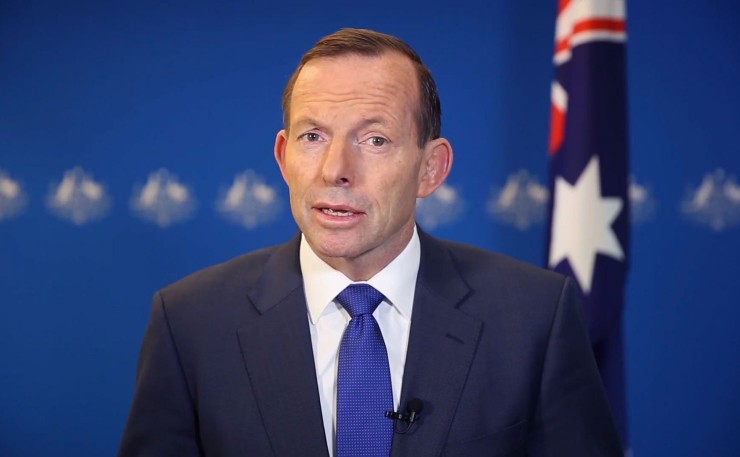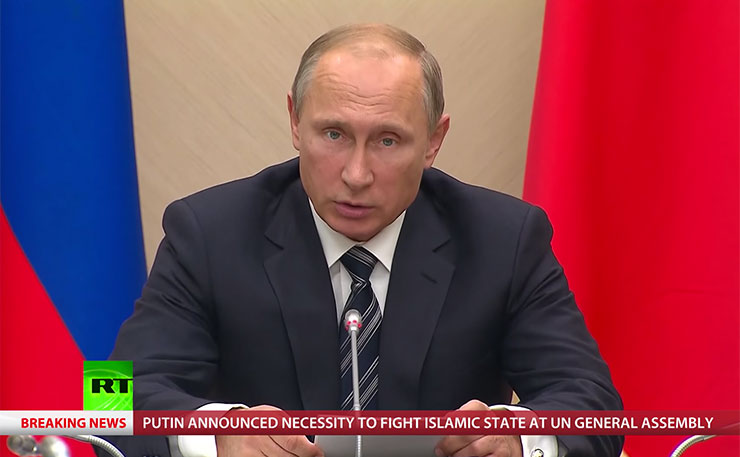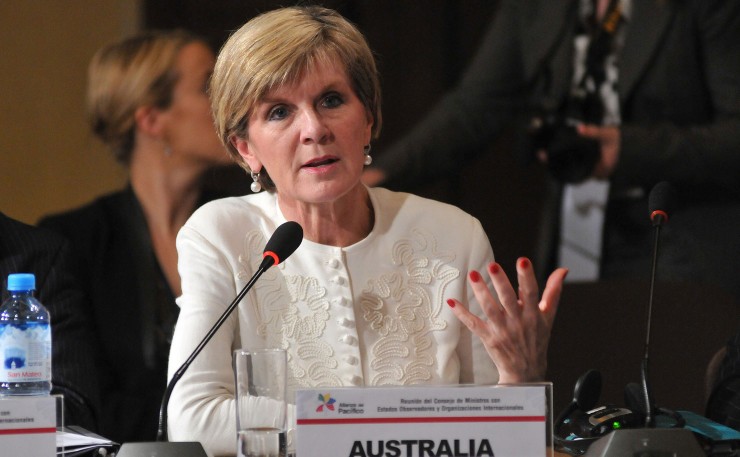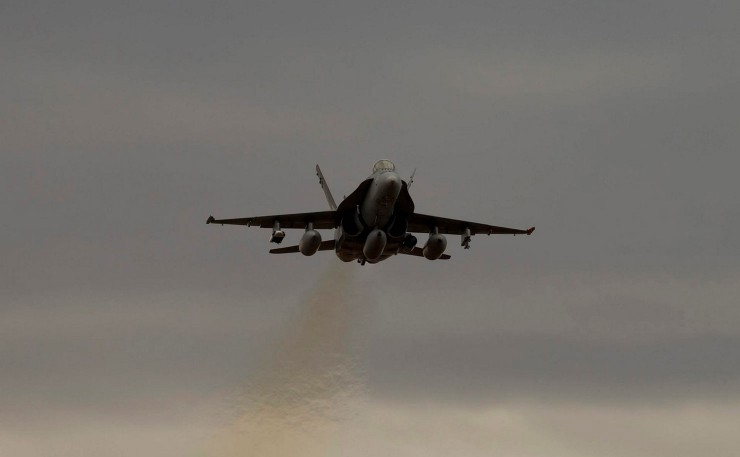James O’Neill provides a simple guide to why our actions in the Middle East, once again, are illegal under international law.
In August of this year the then Abbott government made a number of statements indicating that they were planning to use Australian war planes to bomb ISIS targets in Syria.
The government has since confirmed bombing has commenced.
The legal basis upon which this policy rested is unclear. Julie Bishop, the Foreign Minister then as now, said that the United States had set out the “legal basis” for bombing ISIS in a letter to the United Nations “some time ago.”
Ms Bishop did not specify what that “legal basis” was, although we know from other sources that the US in its letter to the Secretary General of the UN had invoked the provision in Article 51 of the UN Charter to go to the “collective self defence of Iraq” which was under threat from ISIS fighters crossing the border between Iraq and Syria.
The major problem with this argument is that the International Court of Justice has ruled on a number of occasions that to invoke the collective self-defence of another, the attacks in question must emanate from another State.
Whatever its pretensions, ISIS is not a State in any legal sense of the word.
Mr Abbott, with the apparent support of Ms Bishop, also referred to the border being “ungoverned space”. If they (ISIS) did not respect international borders said Mr Abbott, then “why should we?”

This characterization is not only a legal fiction, it is dangerous nonsense. That the head of a government and its Foreign Minister should even advance such an argument beggars belief.
The Australian Government was also part of the US led chorus of ‘Assad must go’ without ever explaining how the removal of the elected government would create a situation in Syria that was conducive to significant improvements in the lives of its citizens.
Repeating ‘Assad must go’ as a mantra is another way of calling for regime change. International law is absolutely clear on this point – one may not intervene militarily in another country to bring about regime change.
Although considerations of illegality were not part of the government’s equation, that mantra has, for the time being at least, been dropped from Ms Bishop’s rhetoric.
Abbott and Bishop have also at various times invoked the concept that the Assad government is “unable or unwilling” to prevent the actions of ISIS on its territory, and by extension to prevent ISIS from crossing the border into Iraq to wreak further havoc there.
The “unable or unwilling” argument was clearly designed to provide a legal fig leaf for using force to offset any looming humanitarian catastrophe in Syria. That argument, although invoked on other occasions, is of dubious legal merit, and that is only one of its problems.
The experience of Iraq, where the pretext of weapons of mass destruction, or Libya where Gadhafi was allegedly killing his own citizens, are fresh enough in the minds of most to caution against the perils of “humanitarian bombing”. Terrible destruction was wrought upon the civil society of both countries by those manifestly false pretexts. As events in recent years have amply demonstrated, it is widely open to abuse.
It’s also rather difficult to argue that one is opposed to the activities of radical Islamic groups while at the same time, busily supplying them with arms, financial support and mounting what must be the least effective military bombing campaign in recent military history. This is precisely what the US and its Gulf allies, such as Saudi Arabia and Qatar, are doing
Notwithstanding the vaunted technical capabilities of the US military – including satellites in geo-stationary orbit over Iraq and Syria noting everything that moves on the ground and intercepting all electronic communications – fleets of ISIS vehicles have until recently moved with apparent impunity over open spaces in the Iraq and Syrian deserts.
One says “until recently” because the drastic game changer in Syria hasn’t been Australia’s token contribution announced in September, but the intervention since October of the Russian military. The Russians are in Syria at the invitation of the Assad government, as are Iran and Hezbollah. No such invitation was extended to either the US or Australia, thereby eliminating another of the possible legal bases for military intervention.

The Australian Government’s response to the Russian and Iranian intervention was predictable. That the Russians had been devastatingly more effective in four weeks of their campaign compared to a year of the alleged American effort to eliminate ISIS was ignored. Instead there was a lament that the Russians were bombing the “wrong” fighters, hitting a range of terrorist targets and not just ISIS.
This was a defence of the so-called “moderate” opposition to the Assad government. There is in fact no such beast. As the Russian Foreign Minister Lavrov pointed out, if it looks like a terrorist, talks like a terrorist and behaves like a terrorist then it is a terrorist.
He invited the Americans to point out these so-called moderates so that they could be left alone. He received no response.
Mr Lavrov then asked for the ISIS terrorists to be pointed out so that the Russians could concentrate on them. Again, he received no response.
America’s alleged invitation
The legal basis for the alleged American “invitation” to join in bombing Syria has never been explained. Iraq could have asked for Australia’s assistance, but no such invitation has ever been publicized. It would, in any case, not be a viable argument for the reasons set out above.
Syria has certainly not sought Australia’s help. Any invitation from the Americans, whether solicited or not as has been suggested was the case, has no foundation in international law.
The only possible legal basis for an Australian intervention in Syria would therefore have to be the two remaining elements of Article 51 of the UN Charter – self defence or a resolution of the UN Security Council.
Australia has no claim to self-defence, and hasn’t even tried to advance such an argument. A Security Council authorization is manifestly lacking. The only relevant resolution, 2170 of 14 August 2015 condemned ISIS and urged all states to cooperate in bringing ISIS to justice. There was not even a hint of Article 51 authorization for the use of force.
We therefore have to come back to the central question: what exactly is Australia’s legal justification for bombing Syria?
Australia’s legal justification
Ms Bishop said on August 24, 2014 that the government would “certainly” take its own legal advice before committing to joining the air strikes. The clear impression Bishop ‘s statement created was that as of August 24, 2015 no such legal advice had been obtained, and no decision to join the airstrikes would be made before that advice provided the government with its necessary legal cover.
The content of that legal advice was therefore of considerable interest. Accordingly, on September 8, 2015 before the Abbott government announced its decision to join the bombing, I requested a copy of that legal advice pursuant to the provisions of the Federal Freedom of Information Act 1982, and for the associated relevant documents.
On November 9, 2015 a decision on my request was made and that was to refuse access to the documents sought. That was unsurprising. What the schedule of 52 relevant documents disclosed, however, was a surprise.

The documents in the Schedule included the expected emails between the three relevant departments, Attorney General’s office, the Department of Defence, and the Department of Foreign Affairs and Trade.
Also included however, was a document dated September 24, 2014 headed “Draft Legal Advice”, and four further documents all dated September 30, 2014 headed “Legal Advice”.
A subsequent inquiry confirmed that the dates were not typographical errors but the advices were in fact all from 2014. Therefore, when Ms Bishop said on August 24, 2015 that the government would take its own legal advice before committing to the airstrikes she was at best being disingenuous.
As a member of the Cabinet and of the Security and Intelligence committee she must have known that the legal advice had already been given, nearly one year earlier. In all likelihood the Cabinet had discussed the advice and the decision to accept the American “invitation” was part of an ongoing and elaborate charade.
The legal advice is clearly important. If it said that it was legal under international law for Australia to join the bombing of Syria, then that would be fascinating in its own right as it would clearly be contrary to the overwhelming body of international law opinion, including several judgments of the International Court of Justice.
If, on the other hand the advice was such that an action would be illegal under international law (and they are the only two possible logical alternatives) then the government has gone ahead in defiance of that advice. It would be a reasonable inference that would have been for political (i.e. keeping the Americans happy) reasons.
Conclusion
By claiming legal professional privilege in refusing to release those opinions of September 30, 2014 we are denied knowledge of the legal basis upon which the government actually made its decision. The ostensible reasons, as noted above, are little short of derisory.
Apart from refusing to release the legal basis upon which the judgment was made, the government has also refused to permit a debate in either the House or the Senate, proposed by the Australians Greens. It therefore presumably feels safe from critical scrutiny, the Labor opposition being notoriously acquiescent in matters of “national security”.
That debate is essential in the light of the recent attacks in Paris. The revulsion generated by that mass murder, and the murder of more than 200 Russian citizens over Sinai, should not cloud the requirement that the appropriate response is still one that has to be governed by our obligation to function within the proper international law framework.
The history of Australian governments is not encouraging in this regard. It is not only contempt for international law (far from the first) that this government is demonstrating by its attack upon Syria.
It is also contempt for the fundamental principle that the people are entitled to be consulted, and their views respected, on something as critical as waging war.
That such principles are so easily ignored is a sorry commentary on our present political environment.
Donate To New Matilda
New Matilda is a small, independent media outlet. We survive through reader contributions, and never losing a lawsuit. If you got something from this article, giving something back helps us to continue speaking truth to power. Every little bit counts.





